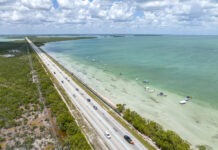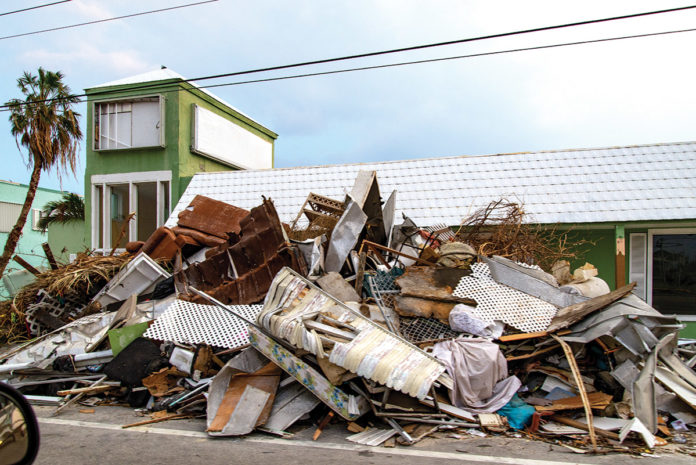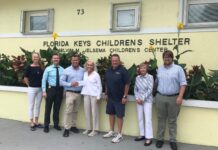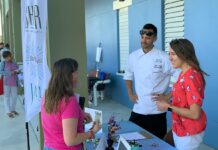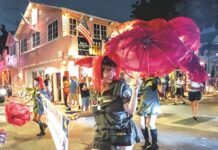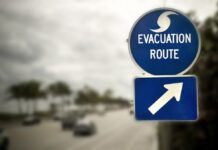In the Keys, information about hurricane preparedness and evacuations is plentiful wherever you look. But all too often, those returning to an area ravaged by a storm are often left with the same question: “Okay, now what?”
It goes without saying that every hurricane is different, and the severity of damages and the post-storm environment will vary with each weather event. However, some tips are critical regardless of the situation. After speaking with first responders and emergency management officials, here are the tips that Keys Weekly heard stressed above all:
FOLLOW THE PLAN
Decisions to call for tourist or resident evacuations are not made lightly, and the same goes for phased reentry programs. Following the directions of emergency management officials and first responders is the absolute key in any disaster situation.
“We base our decisions on the information we’re getting from the National Weather Service,” said Shannon Weiner, Monroe County’s director of emergency management. “It’s definitely a threat level-based decision. And the first thing we’re working on is making sure it’s safe so residents can get home, because we all live here too.”
“Everything works, if everyone follows the directions,” said MCSO captain Don Hiller. “There’s a lot of science going into these decisions. People have to be confident that we’ve got a lot of people who are living and breathing this 24 hours a day.”
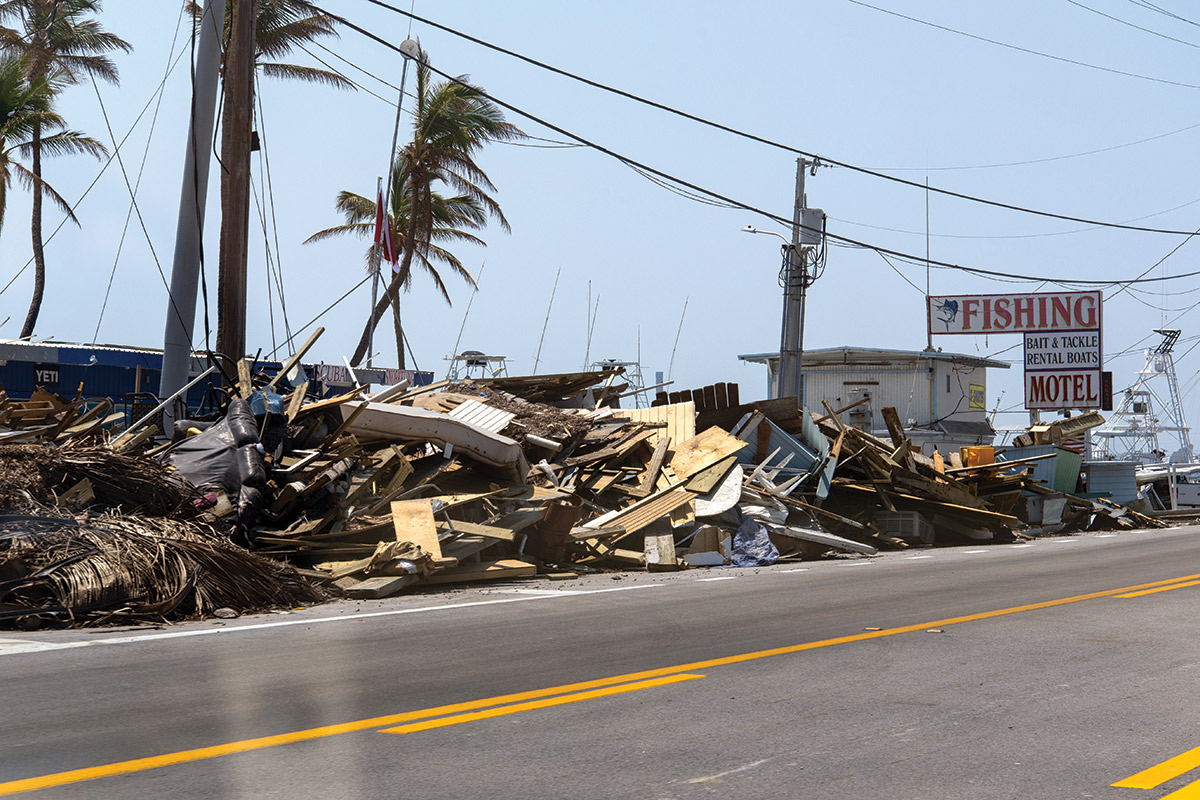
UNDERSTAND THE SITUATION
In the aftermath of a storm, residents may be left without access to critical resources, including power, water, gas, food, phone service, and emergency medical services. Every storm brings its own challenges, but residents planning to ride out a hurricane or return immediately after should be fully equipped to be self-sufficient for days or even weeks with no outside assistance or purchases.
Islamorada Fire Chief Terry Abel said people should have their own plan ready in times of a storm.
“Make sure you have enough supplies for 72 hours. That’s what it took for this station to get back online following Irma. My house on Plantation Key, we were down five solid days,” he said.
For those with underlying health conditions, returning to potentially moldy environments with no air conditioning can escalate respiratory and cardiac conditions. “We did have some severe medical issues with people coming back,” said Marathon fire chief John Johnson. “We lost a few, and a few had to be transported out right away.”
BE PART OF THE SOLUTION, NOT THE PROBLEM
While roadblocks like the controversial ones put in place in the Upper Keys following Hurricane Irma are exceedingly rare, they are used to manage situations in which law enforcement and other first responders cannot adequately serve residents in danger and ensure that enough resources are available to serve returning residents. Even in the absence of these barriers, emergency management personnel and first responders are spread thin in their attempts to manage a natural disaster. Residents must be mindful of the tasks they undertake immediately after the storm; unless there is an immediate life safety concern, most jobs can be pushed off. In other words, don’t climb up on an intact roof with a chainsaw and start chopping up branches.
“The bottom line is, if you fall off your roof trying to repair your roof after we let you in, there’s no hospital,” said Don Hiller. “And you can’t call an ambulance, because your phone doesn’t work. … So it becomes a life or death situation. … More people magnify the problem. Imagine your family not being able to get services if you need it.”
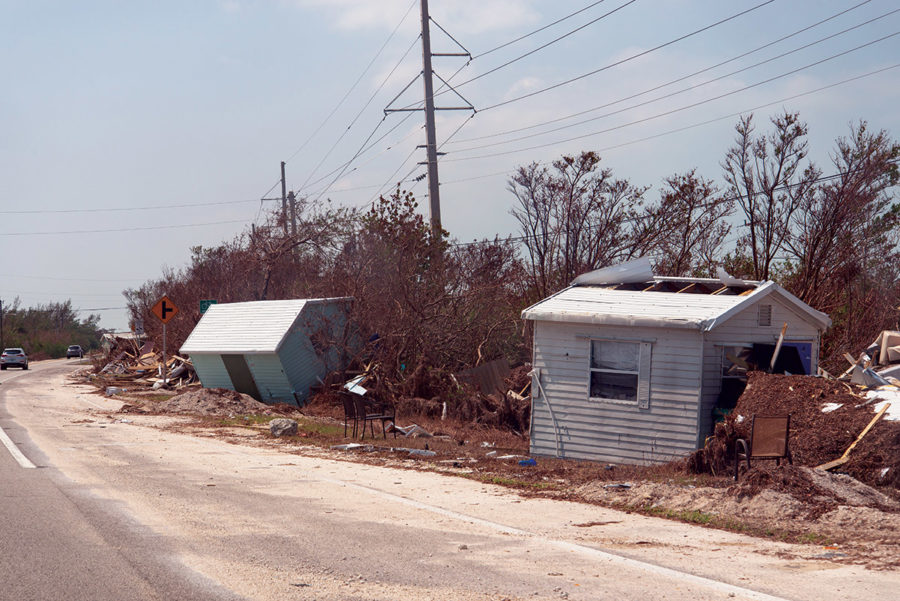
YOUR PROPERTY’S BEST DEFENSE
Although there were some reports of looting following Hurricane Irma, most instances were “crimes of opportunity” in which property was not properly secured. The best defense? Making all possible preparations before a storm. That means boarding up those windows, locking and sealing doors, and taking in every possible item from your yard or the exterior of your home. In extreme cases, a post-storm curfew may be enacted to assist law enforcement in preventing looting during evening patrols.
Take extensive photos and videos of your property, your home and its contents both before and immediately after the storm. “Do that before you start to clean up,” said Weiner. “The more you can document it, the more backup you’re going to have when you go to file an insurance claim.”
911 IS *STILL* FOR EMERGENCIES ONLY
Use of the 911 system is for emergencies only, not for calls about power outages, water leaks, and storm recovery information. “(After Irma) our 911 was so taxed for non-emergency stuff that we almost shut down the system due to overburden,” said Hiller.
THE NUTS AND BOLTS
- Turning off water lines before a storm, or immediately after, can help when it comes time to repressurize the system. Be sure to check water lines out at shorelines and docks, which are exposed and break easily.
- Even after water service is restored, be prepared to boil or otherwise sterilize tap water.
- DO NOT attempt to re-energize a home until it has been properly inspected.
- Items with lithium batteries damaged by salt water, including electric cars, scooters and bikes, are a fire hazard, particularly as they begin to dry out. “We had two significant car fires inside of garages (after Irma),” said Johnson. “As the salt water dries off, the salt maintains a connection with the batteries, and they shorted and started a fire.” Properly inspect all battery-powered items, and keep them away from your home or other flammable items.
- If you plan to use a generator, make sure you have the proper electrical connections and that your generator is powerful enough to run the appliances or devices you expect to use. Only run generators in well-ventilated areas.
- Prepare to make most purchases in cash until power and network services are restored.











